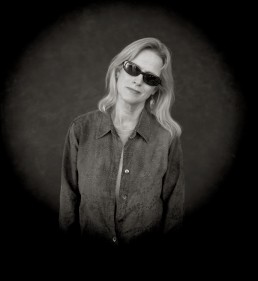S2: Episode 13 - Marian

Episode Information
[Intro Music]
Narrator: Welcome to Hunger and Resilience, narrative histories about the complexity and experiences of hunger. A traveling exhibition and weekly podcast edited and hosted by Michael Nye, supported by the San Antonio Food Bank, Eric Cooper, executive director. We are grateful for the honesty and eloquence of every voice. Episode 13, Marian.
Marian: I can remember when I was three or four years old. One image is this red wagon. My grandfather would drag me around all day long. I remember the smell of tobacco. I remember his hands. He was always lifting me out of that wagon, putting me back in. I felt so loved and cared for. My name is Marian and I teach history classes, but I also teach cultural studies classes in race, ethnicity, class, gender. And that’s what I love about history. Now, this sense that we’re making history every day, uncertainty to me as a child meant I wasn’t sure that we would have stuff to eat. I just remember lying in bed at night sometimes when we didn’t have much to eat for supper and thinking, I need to go to sleep and I’m gonna get something to eat in the morning. And if you have ever been hungry, if you ever didn’t have food, it takes you a long time to trust that you’re gonna always have it.
For years after we experienced hunger, I kept thinking, when’s that gonna happen again? Reading saved my life. I could feel safe inside a book. It just gave me a world, you know, and I just didn’t feel trapped by my circumstances. And the other thing was just being empowered by connecting with other people. Like there were other people besides the small world that I lived in. My father did have two really distinct sides to him. They were just so extreme because he was extremely intelligent. He was also very, very handsome. But the other side was his alcoholic side. He would leave me at the age of eight in charge of four younger siblings at night, or he would make us sit outside in the car while he got drunk, and then he would drive us home.
I’m, I’m really angry about poverty in this country because I think that people who are middle class, and especially people who are rich, have a tendency to really look down on poor people and to think it must be their fault. They didn’t make it. My mother worked her head off. I mean, she worked, you know, she was fully employed all the time. She was a private duty nurse. She went once over two years without a day off. I’ve always grown up understanding that this whole idea about the American dream is so limited. You know this business about you. If you work really hard, you, you can pull yourself up by your own bootstraps. And, uh, yes, you, you can, you need a lot of luck. You need some breaks. You need some friends to do that. And our own poverty was so frustrating because it was like, you watch this person work that hard and never have any money.
One Christmas, somehow we didn’t have any food. And I don’t know how my aunts and uncles even found out about it because my mother really hid our situation. But at the end of the evening, and it really was right at the end of the evening here, they all came out with paper bags, filled with groceries. And I, I, I mean, I really wanted to be happy about it. And my little brother and sister, I remember them, they were so excited, you know, we don’t have to worry about money or we don’t have to worry about food. And then I, I look at my mother, she, she, her face started to sort of twist and she didn’t say anything. All she did was sob. I still remember watching her body shake. But I, I understood maybe for the first time, and I always think this is one of the ends of my childhood, <laugh>, is that moment because I understood that she was really humiliated by being in such a position that someone had to give her food for Christmas.
[Outro Music]
Host: Marian reminds us that it’s easy to make assumptions about those experiencing hunger in our communities. Well, they must be lazy or they must be irresponsible. Responsibility means respecting the rights of others, paying for what you receive, keeping your promises. Many that have examined these complicated issues carefully understand someone can be poor and experience hunger. And at the very same time, be responsible. Marian is a professor, a poet, humanitarian. She’s one of the most generous people I know always giving to others. We are grateful for Marian’s elegance and presence. Make something in her story. Stay with you. I’m Michael Nye. You may go to my website, michaelnye.org/podcast for photographs and transcripts. Thank you for listening.
